Happy Friday! In case you missed it, we’re offering $50 off Dispatch Premium memberships with the promo code SCOTUSBLOG. Join today!
Quick Hits: Today’s Top Stories
- Pakistani and Indian troops exchanged fire along the line of control separating the two countries overnight, three days after separatist gunmen killed 26 people in Indian-ruled Kashmir. The cross-border fire, which Indian military officials accused Pakistan of initiating, came as both countries moved to revoke visas for one another’s citizens, ordering them to leave in the coming days. Also this week, India closed a primary border crossing and terminated a 65-year-old water-sharing treaty with Pakistan. A separatist group known as the Resistance Front took credit for the Tuesday terrorist attack, which India alleged contained “Pakistani elements.” New Delhi has long accused Pakistan of arming militants to carry out terrorist attacks—charges Islamabad denies.
- President Donald Trump said Thursday that he was “not happy” with Russia’s overnight missile and drone barrage on Kyiv, which killed at least 12 people and injured more than 90 others to become the most fatal airstrike on Ukraine’s capital since July 2024. “Vladimir, STOP!” Trump wrote on Truth Social, referring to Russian President Vladimir Putin. “5000 soldiers a week are dying. Lets [sic] get the Peace Deal DONE!” A day earlier, Trump criticized Ukrainian President Volodymyr Zelensky for his refusal to recognize Russia’s occupation and annexation of the Crimean peninsula, saying his insistence “will do nothing but prolong the ‘killing field.’”
- A Russian military court on Thursday sentenced Ivan Popov—a former Russian commander who criticized senior military leaders after he was removed from his post—to five years in a penal colony after finding him guilty of large-scale fraud. After his dismissal in July 2023, Popov sent a voice memo to his troops claiming he had been pushed out for highlighting the military’s poor reconnaissance capabilities and the high number of casualties—remarks that were later made public. Speaking to Russian state media, Popov’s lawyer indicated plans to appeal the ruling, which supporters denounced as politically motivated.
- U.S. District Court Judge Stephanie Gallagher ruled on Thursday that the Trump administration must issue a “good faith request” to the El Salvadoran government for the return of a 20-year-old Venezuelan man, identified only under the pseudonym “Cristian,” who the White House deported to the El Salvador’s megaprison last month over his alleged involvement in the Tren de Aragua gang. Cristian initially entered the U.S. illegally as an unaccompanied minor, and, in 2019, was one of four plaintiffs in a class action lawsuit against the government seeking temporary protection from deportation. A settlement reached in 2024 established that all four could not be removed until their asylum applications were processed. The White House argued that Cristian’s alleged gang connection breached the settlement, but Gallagher ruled that the settlement’s text made no such stipulation and that all four were protected from deportation.
- U.S. District Judge Colleen Kollar-Kotelly ruled on Thursday that Trump’s executive order on securing election integrity cannot require voters to present documentary proof of citizenship to vote in federal elections. “Our Constitution entrusts Congress and the states—not the president—with the authority to regulate federal elections,” Kollar-Kotelly wrote in a 120-page opinion, adding that “Congress is currently debating legislation that would effect many of the changes the president purports to order,” a reference to the Safeguard American Voter Eligibility Act, which recently passed the House but reportedly faces an uphill battle in the Senate. Other provisions in Trump’s March 25 executive order on elections, including increasing oversight into the security of electronic voting tabulators and prosecution of election law violations, are allowed to remain in effect.
Rubio’s Renovation
In his first speech from the State Department’s Washington, D.C., headquarters in January, Secretary of State Marco Rubio praised the distinguished work of its employees. “This is an extraordinary honor and a privilege to serve in this role,” he said. “To oversee the greatest, the most effective, the most talented, the most experienced diplomatic corps in the history of the world.”
But just three months later, he’s striking an altogether different tone. “We will drain the bloated, bureaucratic swamp, empowering the Department from the ground up,” Rubio wrote on State’s official Substack on Tuesday, announcing plans to overhaul the agency. He outlined a significant consolidation of several departments and bureaus, singling out offices—including the Bureau of Democracy, Human Rights, and Labor, and the Bureau of Population, Refugees, and Migration—that he accused of “[pushing] through their own agenda.”
“The American people deserve a State Department willing and able to advance their safety, security, and prosperity around the world, one respectful of their tax dollars and the sacred trust of government service,” Rubio concluded.
Reorganizing the State Department is not an unusual step for a new secretary of state to take—most previous secretaries have sought to put their stamp, and the president’s, on their department. But Rubio’s move may be part of the battle taking place behind the scenes of the administration in dozens of different areas: the clash between the cost-cutting ambitions of the Department of Government Efficiency and career politicians like Rubio who generally want to reshape, not just radically reduce, the size and scope of the federal government.
Rubio’s announcement was only the first part of the plan, and weeks or months will pass before the full details emerge. But the main thrust of the initiative, as shown in the announcement statement and an organizational chart posted to the State Department’s official website, is clear: a leaner, meaner, and markedly less “woke” agency.
There are two main structural components of Rubio’s plan. Firstly, the secretary is looking to take a side in a longstanding State Department balancing act between regional and “functional” bureaus. Regional bureaus are exactly what they sound like, focusing on geographical areas—take the Bureau of African Affairs and the Bureau of Near East Affairs, for example. Functional bureaus focus on specific policy areas, like the Bureau of Global Health Diplomacy and Security.
Rubio aims to concentrate more policymaking power in the heads of regional bureaus, which “will now have the tools necessary to advance America’s interests abroad because region-specific functions will be streamlined to increase functionality.” In non-bureaucratic language, that means that different bureaus will, at least in theory, be less likely to step on each other’s toes. For example, the secretary announced that all non-security foreign assistance, such as food aid and democracy promotion, will be “consolidated” under regional bureaus, rather than functional ones.
For many foreign policy experts, efforts to streamline some of the State Department’s functions are a welcome change. “State has always had the geographic bureaus as its center of gravity,” Kori Schake, the director of foreign and defense policy studies at the American Enterprise Institute and a former official in the State Department, National Security Council, and Department of Defense, told TMD. “The functional bureaus often don’t think regionally enough,” she added.
But others argue that Rubio could be too optimistic about the ability of regional bureaus to quickly adapt to their new role. “They primarily focus on the business of the embassies,” said Frederick Barton, a lecturer at Princeton’s School of Public and International Affairs and the first assistant secretary of state for conflict and stabilization operations under President Barack Obama (a position which is slated to be eliminated). Dealing with emergent situations like ethnic conflict or corruption, which are often handled by functional bureaus, might be difficult for diplomats used to working closely with foreign governments to handle. “Those are awkward issues to raise in a country, and so striking that balance has always been sought by a secretary of state,” Barton told TMD.
But Rubio appears convinced that paring down the department is the best strategy. The Bureaus of Conflict and Stabilization Operations, the Office of Global Women’s Issues, and the Office of Global Criminal Justice will all be eliminated. And offices dedicated to arms control, energy, and human trafficking will be merged with existing bureaus.
It’s clear, however, that the move isn’t solely about cutting down on bureaucratic turf wars. This is where the second goal of the plan, eliminating entrenched progressivism, comes in. Many of the offices that were eliminated or downgraded in status were those overseen by the under secretary for civilian security, human rights, and democracy. This “expansive domain,” Rubio said, “provided a fertile environment for activists to redefine ‘human rights’ and ‘democracy.’”
The secretary claimed that the Bureau of Democracy, Human Rights, and Labor, for example, had pursued “vendettas” against “‘anti-woke’” politicians in Hungary, Brazil, and Poland. Meanwhile, he accused the Bureau of Population, Human Rights, and Migration of funnelling “millions of taxpayer dollars” to groups that “facilitated mass migration around the world.”
Democratic members of Congress, meanwhile, characterized the reforms as another example of executive overreach. Rep. Gregory Meeks of New York, the ranking Democratic member of the House Foreign Affairs Committee, condemned the “potentially sweeping changes” and called for Rubio to testify immediately before Congress. “Secretary Rubio’s proposed reorganization of the State Department, developed with zero consultation with Congress, raises significant concerns about the future of American diplomacy,” Meeks said in a Tuesday statement, arguing that the State Department was abandoning the defense of human rights and democracy and “eviscerating American soft power.”
Meeks may be right that Congress will eventually have to be consulted on the moves. According to some former State officials, the cuts risk eliminating positions and departments that are mandated by Congress. In order to get rid of these programs, Rubio may have to seek congressional approval, although there are no indications as of yet that he intends to do so. Earlier this year, Rubio oversaw the effective dismantling of the United States Agency for Aid and International Development, which was codified by Congress in 1998.
Schake, however, noted that it was “fair” for a secretary of state to attempt to ensure that the federal department’s operations reflect a president’s agenda. There is sometimes “a belief at State that they are the guardians of American foreign policy,” she told TMD. “We would never tolerate that [view] from the Pentagon.”
And a pared-down version of proposals to reform the department appears to have won out. Last week, the New York Times reported on leaked internal memos from the State Department, which outlined plans to potentially cut the agency’s budget by nearly half, with a particular target on funds earmarked for humanitarian assistance. Another draft executive order, also reported on by the Times, envisioned shutting down almost all of the State Department’s operations in Africa.
The flurry of conflicting proposals may represent fluid and shifting debates within the State Department and the White House, driven in large part by the Department of Government Efficiency’s drive to drastically reduce the size of the federal workforce. Rubio’s plan would close or consolidate more than 100 of the State Department’s roughly 700 offices and bureaus and cut about 700 positions of a total departmental workforce of nearly 80,000. It’s not nearly as drastic as early leaks, although embassy closures and further firings are not off the table as the reorganization proceeds. Rubio, who has sought to defend his department from the more extreme reforms of Elon Musk, DOGE’s leader, appears to have won at least a temporary reprieve.
But as the secretary of state attempts to leave his mark on his department while also managing brewing and existing crises in Ukraine, the Middle East, and Asia, he will need to lean on the institutional knowledge of existing staffers. Working with, rather than against, the State Department will be how Rubio ensures that his reforms are effective and lasting, analysts noted. Too often, “they [administration officials] act like the government is working against them, instead of using people who actually know the system” and genuinely “want positive change,” Schake said.
“I’ve seen people waste all of their energy on reorganizations,” Barton cautioned. “It totally destabilizes institutions, and then you can’t get anything done.”
Rubio, like much of the rest of the Trump administration, is betting that his reorganization will revitalize, rather than hamstring, the State Department. He wrote Tuesday that the American people deserve a State Department “prepared to meet the immense challenges of the 21st Century.” We will see if he can deliver one.
Today’s Must-Read
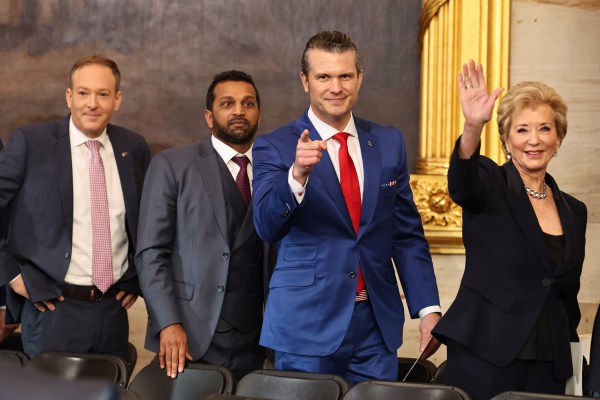
Trump’s Team of Losers
It was a long and winding road after losing a primary bid for a U.S. Senate seat from Minnesota in 2012, but Pete Hegseth has (for now at least) leapfrogged back into politics after being denied all those years ago. He’s not alone. Hegseth is only one member of the second Trump administration to have been plucked from the pantheon of electoral duds and given a second lease on political life. From the Cabinet all the way to high-profile White House aides, there are failed candidates for major office who might have otherwise toiled for years in obscurity or, even worse, local politics if not for Trump’s magnanimity. Contrary to the president’s boasted affection for winners, it’s loyalty to Trump, sometimes even in the face of defeat, that remains the most valuable characteristic for a Republican looking to get ahead these days.
Toeing the Company Line
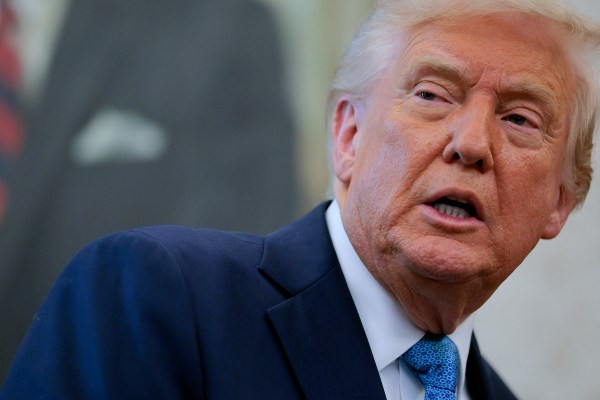
Déjà Vu
How Trump’s Ukraine peace plan resembles his trade war.
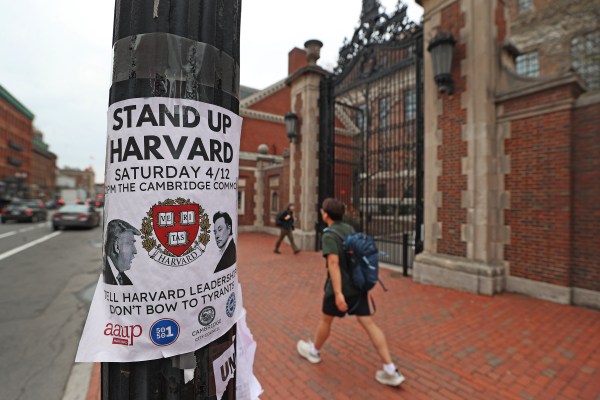
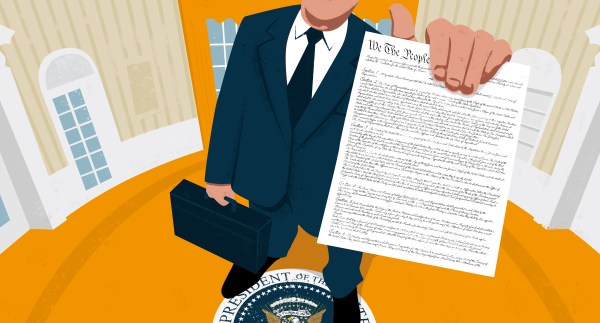
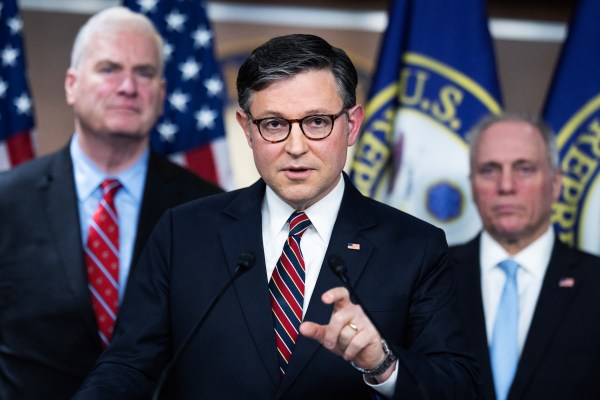



Worth Your Time
- Yesterday, as the world observed Holocaust Remembrance Day, the Times of Israel’s Zev Stub interviewed 99-year-old Michael Smuss, the last known living fighter from the Warsaw Ghetto Uprising. “On the first day of the uprising, the Jewish resistance caught the Germans completely off guard. ‘We had some Polish Jews who had previously fought in the army against Germany, and they thought of everything,’ Smuss said. ‘They were shooting from the balconies with the Italian Berettas, protected by helmets and beds they had set up as shields. When the Germans spread out over the ghetto, they were sitting ducks. Their leaders had no idea what to do. It was a perfect ambush,’” Stub wrote. “Smuss continues to speak to groups about the horrors he saw during the Holocaust and to serve as an inspiration for others. ‘I’ve dedicated my life to helping to make sure this never happens again,’ he said. ‘I’ve gone to Poland with students many times, and I continue to speak about it.’ … ‘During the Shoah, we didn’t have an army of our own. Today, we have a country with God watching over us and an air force protecting us. I’m very grateful for that.’”
- For Public Books, Harry Stecopoulos profiled America’s literary Mecca: Iowa City, Iowa. “Iowa City is the place where contemporary English literature matters more than anywhere else on earth. The home of arguably the world’s most famous MFA program, Iowa City has authors’ plaques embedded in the sidewalk (yes, our streets are paved in literary gold), over 100 literary readings per year, and roughly 1,000 writers—young and old, town and gown—in a community of 75,000. No surprise, then, that in 2008 Iowa City was named a UNESCO City of Literature,” he wrote. “If we want to keep these communities dynamic, we should work hard to keep them weird. Places like Iowa City often have scandalous reputations, particularly when embedded in red states. Yet that reputation sometimes stems not from bacchanalian excess, but rather from a refusal to accept the status quo. Ensuring that our college towns remain places of real not rote learning, of innovative education not AI simulation, means encouraging their residents, within and without the university, to forge ahead, push the limit, break through.”
New York Times: [Former New York GOP Rep.] George Santos, Facing a Possible 87 Months in Prison, Is Out of Jokes
“Right now, my expectation is I’m going to prison for 87 months,” he said flatly when reached by phone on Wednesday. “I’m totally resigned.”
Gone was the pugnacious rhetoric and quick wit that became part of his mystique as he lied his way to Congress, his deceits leading to criminal fraud and a guilty plea. Instead, Mr. Santos was disconsolate and bitter.
“I came to this world alone. I will deal with it alone, and I will go out alone,” he said.
ABC News: DOJ Accidentally Files Document Outlining Flaws With Trump Administration’s Plan To Kill NYC Congestion Pricing
Lawyers with the Department of Justice accidentally filed a document overnight that outlined a series of legal flaws with the Trump administration’s plan to kill New York City’s congestion pricing tolls.
In an 11-page letter to the Department of Transportation, lawyers with the U.S. Attorney’s Office for the Southern District of New York wrote that Secretary of Transportation Sean Duffy’s attempt to terminate congestion pricing faces “considerable litigation risk” and is “unlikely” to be accepted by the court.
NBC News: ‘Trump 2028’ Apparel on Sale at the Trump Organization’s Online Store
In the Zeitgeist
Comedian Nathan Fielder’s latest project, HBO’s The Rehearsal, debuted its second season this week. The show’s premise? Stage meticulously planned “rehearsal” scenarios of real-life events, and have real people act them out as practice for the real thing.
Let Us Know
Do you think the United States needs more or less presence overseas?
